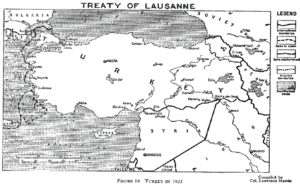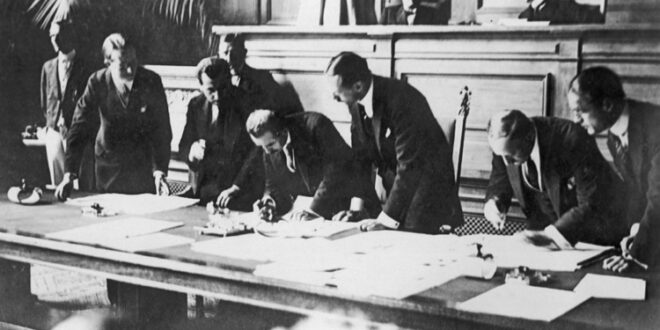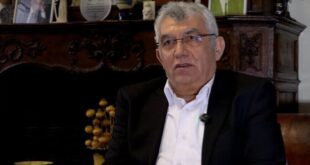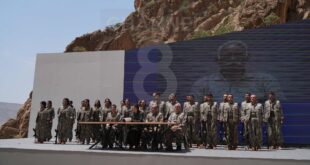“The Westerners, especially the British, were bargaining over Mesopotamia and Kurdistan; the Turkish delegation was almost sacrificing the Kurds to save the Anatolian lands. As can be seen, there is a scenario written and implemented against the Kurds without the Kurds. Because the Kemalist administration had already made secret negotiations and agreements with both the French and the British in 1921 and 1922.”
As the Treaty of Lausanne reaches its centenary, historian Mehmet Bayrak highlights the deepening Kurdish issue, underscores that Turkey’s democracy cannot be fully established without a peaceful resolution to the Kurdish problem. Bayrak criticises the treaty for its role in the division of the Kurdish people and the subsequent ‘unrepairable wound’ it has caused. Despite this, he emphasises that the treaty is not a ‘fait accompli’ for the Kurds, who have resisted its terms for 100 years and will continue to do so until their democratic rights and freedoms are recognised.
Centenary of Treaty of Lausanne and Kurds: A deepening crisis
As the Treaty of Lausanne marks its 100th anniversary, historian and author Mehmet Bayrak points out that the treaty has only deepened the Kurdish issue, stating, “It is impossible to establish and institutionalise democracy in Turkey without finding a democratic and peaceful solution to the Kurdish problem.”

Bayrak penned an article for Yeni Yaşam newspaper, reflecting on the centenary of the Treaty of Lausanne and the subsequent developments. In his article titled “The Treaty of Lausanne and the Kurds on its 100th Anniversary”, Bayrak notes that Lausanne is presented as a sacred text in the official historical narrative.
“As is known, the Treaty of Lausanne was once scrutinised by the Islamist segment and was described as a ‘defeat’, not a ‘victory’, because it did not include many Muslim countries that were previously attached to the Ottoman Empire. In other words, they considered the liberation of Muslim countries from Ottoman colonialism as a ‘defeat’ in the Lausanne negotiations.”
The Eastern Reform Plan
Bayrak criticises Turkey’s approach to those who question the treaty, stating, “Turkey labels those who question and criticise the treaty as ‘non-Sevres’ and ‘traitors’.” He further elaborates on the historical context of the Kurdish issue, “However, it is known that the Kurdish issue in Turkey is not just a problem of today; it is a problem that dates back 100 years, in other words, it is a problem that is as old as the Treaty of Lausanne signed in 1923.”
Bayrak also points out the policy changes that followed the treaty, “Because with the Treaty of Lausanne, the Turkish administration, ‘whose ax came out of the log’, should look for the ‘denial and destruction’ policy, which was replaced by the ‘Eastern Reform Plan’, which we first revealed, and the ‘Silencing Law’ published in 1925 after the Constitution issued in 1924, in other words, the ‘Constitution of the Republic of Turkey for the Kurds’.”
He continues by highlighting the impact of these policies, “These laws and secret plans, which can be described as a ‘social regression movement’, not only created today’s Kurdish problem but also ended the multi-party system, banned the political and social organisation freedom of the working class and caused damage to millions of our people to this day.”
The Process Leading to Lausanne
“The Turkish administration, taking the wind of the Kurdish people who could not digest the Treaty of Sevres, was going to Lausanne and winning a victory for itself.”
Bayrak provides a detailed account of the events leading up to the Treaty of Lausanne. He begins by stating, “In the meantime, both the parties opposing the Union and Progress administration in Istanbul and the Kemalists who crossed to Anatolia were proposing ‘liberation and freedom together’ to the Kurds. The Turkish administration, taking the wind of the Kurdish people who could not digest the Treaty of Sevres, was going to Lausanne and winning a victory for itself.”
He then discusses the Kurdish representation at the treaty negotiations, “The Kurds did not send a separate representative to Lausanne and at the request of Mustafa Kemal, the Speaker of the Turkish Grand National Assembly in 1923, the Kurdish deputies in the Assembly sent a telegram to Lausanne, stating that the delegation led by İsmet Pasha represented the Kurds.”
Bayrak quotes İsmet İnönü’s memoirs to further illustrate the Kurdish-Turkish unity at the time, “With the Treaty of Sevres, the Kurds, like the Turks, saw their homeland in danger… During the continuation of the National Struggle, they demonstrated unity wholeheartedly. Then, during the making of the Treaty of Lausanne, the Kurds were also present with the Turks as patriots… Even in our talks in Lausanne, we defended our national cases as ‘we Turks and Kurds’ as one nation and accepted it.”
He highlights the tragic fate of some of the Kurdish deputies who advocated for unity, “During the stage of the Lausanne negotiations, Yusuf Ziya Bey from Bitlis, one of the Kurdish deputies who led this unity, said in the Assembly: ‘The unity of the Kurds, the obedience of the Kurds, is not in being divided into two parts, but in being managed in one piece… If the Turk and the Kurd do not live by cooperating, there is no end for either of them. Therefore, if any of them betrays the other, there is no future for both.’ However, unfortunately, the same person, along with Hasan Hayri Bey, the Dersim Deputy who led the unity in Lausanne, was executed two years later in 1925…”

An Unrepairable Wound: Lausanne
“The Treaty of Lausanne is not a ‘fait accompli’ for the Kurds. The Kurds have not accepted this treaty since the day it was signed, and they have been resisting for 100 years. The only way to get out of this crisis is to secure peace.”
Bayrak states that Lausanne resulted in the division of the Kurds as a people and a country, adding that the Kurds have received an “unrepairable wound” since this date. “The Westerners, especially the British, were bargaining over Mesopotamia and Kurdistan; the Turkish delegation was almost sacrificing the Kurds to save the Anatolian lands. As can be seen, there is a scenario written and implemented against the Kurds without the Kurds. Because the Kemalist administration had already made secret negotiations and agreements with both the French and the British in 1921 and 1922. In fact, the prohibition of the Kurdish identity after the signing of the Treaty of Lausanne was stemming from the audacity taken from these victorious states.”
‘The Only Way is to Secure Peace’
Despite all these negatives, Bayrak adds, “The Treaty of Lausanne is not a ‘fait accompli’ for the Kurds. The Kurds have not accepted this treaty since the day it was signed, and they have been resisting for 100 years. The only way to get out of this crisis is to secure peace. It is impossible to establish and institutionalise democracy in Turkey without finding a democratic and peaceful solution to the Kurdish problem. The Kurds have been resisting for 100 years, and they will continue to resist until they achieve their democratic rights and freedoms.”
———————
Cover photo: Signing ceremony of Treaty of Lausanne / Thebritishacademy.ac.uk
This article was originally published by Medyanews.net
 Infowelat Enformasyon Ji Bo Welat
Infowelat Enformasyon Ji Bo Welat




